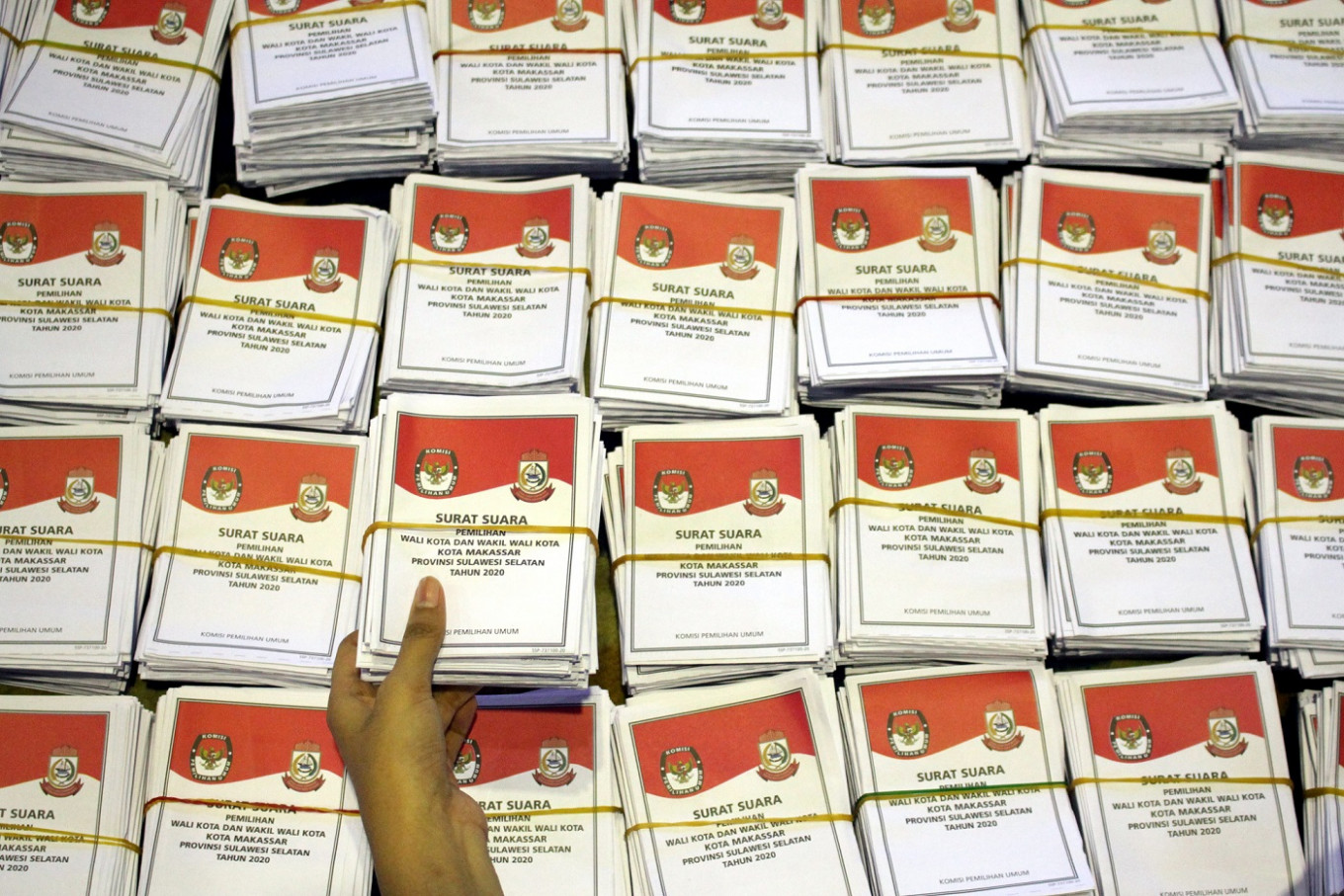What to expect in next month's regional elections
Unlike previous elections, and for the first time in the nation’s history, the COVID-19 pandemic will cast a long shadow over the political contests.
Change Size

The simultaneous regional elections scheduled for Dec. 9 have been touted as the biggest such event in Indonesia since 2015.
This year, 270 regions across the archipelago will stage races. Some 100 million registered voters, which make up roughly 40 percent of the country’s population of 260 million people, will elect nine governors, 37 mayors and 224 regents.
Unlike previous elections, and for the first time in the nation’s history, the COVID-19 pandemic will cast a long shadow over the political contests.
Epidemiologists and election observers have pinned hopes on the General Elections Commission (KPU) to prevent any stage of the contest from becoming new sources of viral transmission.
Where do we stand with the preparation?
With less than two weeks until voting day, all 743 candidates are knee-deep in their election campaigns. The official campaign period runs from Sept. 26 until Dec. 5. However, the KPU has advised everyone to shift their campaign activities online and to refrain from holding in-person rallies in light of the coronavirus outbreak. To enforce this, the commission issued a KPU regulation back in September.
The rule also allows, under very limited circumstances, for opportunities to host face-to-face indoor rallies if it is otherwise impossible to campaign online. Such events must guarantee strict adherence to health protocols and involve no more than 50 attendees.
The Elections Supervisory Agency (Bawaslu) may order crowds to disperse or shut down any campaign activities deemed to be in violation of social distancing rules if the campaign teams or the attendees ignore the KPU orders. Bawaslu may also report repeat offenders to the KPU and recommend the issuance of warnings to any candidates, political party cadres and campaign teams that violate protocol.
Even with strict measures in place, violations persist.
Bawaslu member M. Afifuddin said his agency had recorded 2,126 health protocol violations so far, ranging from neglecting physical distancing measures to not wearing masks, as candidates had kept hosting in-person events in the first two months of campaigning.
“We also have had to disperse 197 of them,” Afifuddin said on Wednesday.
After the campaign period ends, candidates face a “period of quiet” from Dec. 6 through 8, during which they are not allowed to promote their candidacies.
Home Minister Tito Karnavian has asked law enforcement authorities and public order personnel to remove any and all campaign props during these days, which includes all manners of billboards and banners displayed in public.
What can we expect on the election day?
Observers have warned of low turnout rates as they predict the viral outbreak to discourage voters from heading to the ballots. As many as 298,853 polling stations have been set up across the nation nonetheless, and the KPU has vowed to enforce strict health protocols on Dec. 9 to prevent dwindling numbers.
On the day of the election, voting will commence at 7 a.m. and end at 1 p.m. Each registered voter would be prescribed a specific time of day to cast their ballot, so as to prevent a large assembly of voters at polling stations, said KPU commissioner Evi Novida Ginting Manik.
Voters will be required to wear masks throughout the balloting process, and they will only be allowed to enter the polling station if they log a maximum body temperature of 37.3 degrees Celsius. Those who surpass this upper limit will be escorted by local polling station working committee (KPPS) officials to a separate room.
During the balloting, KPPS members must ensure that each voter exercises physical distancing and refrains from making any direct contact with other people. Committee officials are also required to provide handwashing stations and hand sanitizer at the polling station at all times.
National Police spokesman Insp. Gen. Argo Yuwono said police officers would be on standby to reprimand any voters or organizers who appeared to be violating health protocols at each of the voting stations. Police officers will also be operating under an oath of neutrality.
“In addition to that, we will also maintain security at voting stations and at all other stages of the election,” he said in a briefing at the police headquarters on Wednesday.
What will happen once the ballots are cast?
After balloting, KPPS members have six days, from Dec. 10 to 15, to count the votes and tally the results in each and every polling station in the country.
These results will later be verified at the district level and again at regional KPU offices at the city and regency levels. For gubernatorial races, the city and regency level results will be passed on to the respective provincial-level KPU offices.
All regional KPU officers will have a total of five days, from Dec. 16 until Dec. 20, to check all the votes and announce the election winners.
Candidates who are dissatisfied with the results can file for an election dispute settlement with the Constitutional Court (MK). According to an MK regulation issued on Nov. 16, candidates can register their disputes from Dec. 13 to Jan. 6, 2021.
The plaintiffs will then undergo a string of hearings at the court beginning on Jan. 25 and onward. The court justices are expected to issue their final ruling between March 19 and March 24, 2021.









